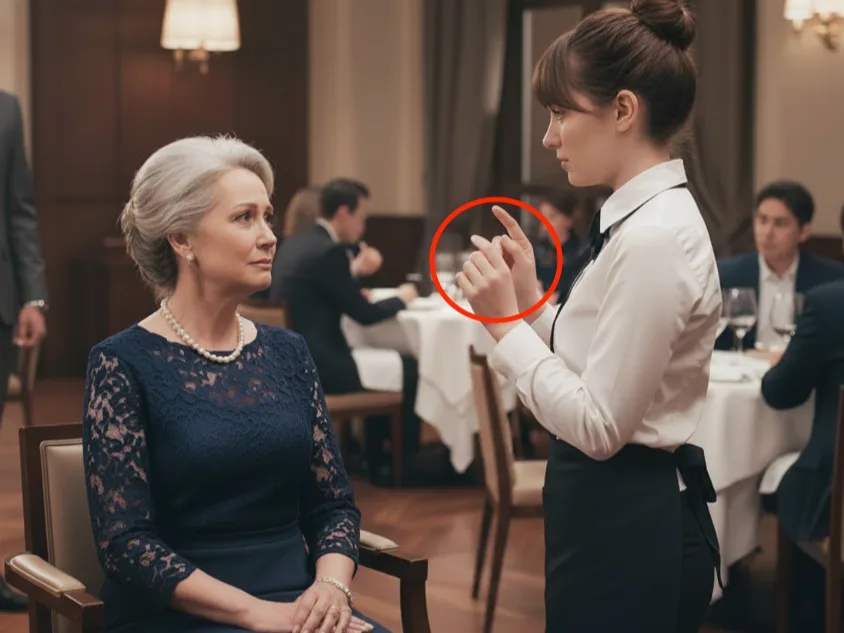Evan Rourke guided his deaf mother through the café’s narrow aisle, already half-focused on the messages stacking up on his phone. Margot tapped his wrist and signed a question he failed to catch. Before he could ask her to repeat it, someone else responded.
The waitress—small, quiet, seemingly forgettable moments earlier—answered Margot’s sign without hesitation. Her movements were effortless, instinctive, shaped by muscle memory rather than study. Margot brightened at once. Evan froze mid-step, unsure which surprised him more: his mother’s delighted reaction or the waitress’s fluency, slipping out of her like a reflex.
Lena Gray, her name tag read. She blinked, slightly embarrassed by her own instinctive reply, as if she’d spoken out of turn. Evan managed a polite smile, but his mind was already racing. Most hearing people took years to sign with that ease. Lena’s response had been instant, almost intimate.
Evan recovered enough to thank her, though he kept his gaze on her hands. Most hearing signers hesitated between gestures; Lena didn’t. She moved like someone raised inside silence. When he asked where she learned to sign, she hesitated and said, “I had a deaf friend, learned it for them.” It didn’t convince him.

He pressed a little, not aggressively, just curious. People so fluent in Sign Language usually had personal reasons, like a deaf family, a partner, or years of volunteering. But Lena redirected the conversation with polite ease, keeping the focus entirely on Margot. It felt intentional, like she did not want to be pried into.
Margot signed something teasing, and Lena responded instantly, fingers flicking in a regional style Evan barely recognized. His mother let out a silent giggle, shoulders shaking. Evan watched the exchange, feeling that odd tug in his chest again. Whatever Lena tried to hide, his mother had already slipped past her defenses.

When they left, Margot tapped Evan’s wrist twice in firm insistence. He understood the gesture well enough. She wanted to come back tomorrow. Margot rarely asked for repeat outings. Routines tired her; unfamiliar environments exhausted her. Yet here she was, eager to return to a place defined by a stranger.
Evan agreed, though curiosity tugged more than obligation. The venture deals on his plate could wait. Something about Lena’s instinctive signing unsettled him. It was like he’d caught the loose end of a thread woven into someone else’s life, and he was intrigued.

The next morning, Lena seemed surprised to see them. Margot greeted her warmly, signing with the particular rhythm she used only with people she trusted. Lena answered in perfect sync, subtle affection slipping into her hands. Evan noticed. He also noticed Lena’s posture stiffen the moment he tried to join in.
He asked again how long she’d been signing. She smiled politely and said, “Quite some time now.” Her eyes held a quiet apology, like she knew he deserved more but couldn’t offer it. Lena did not seem shy, but reticent. Though his instinct told him to stop prying, he was curious about her.

Margot didn’t notice the tension. She studied Lena with open fondness, fingers asking questions Evan couldn’t follow. Lena answered each gently, warmly, as if speaking to someone she genuinely liked. Evan felt vaguely jealous of the effortless connection between them that he, as her son, sometimes struggled to create.
By the time they finished breakfast, Evan was certain of two things: Lena wanted no attention, and something about his mother made her drop her guard despite herself. But with him, she kept a careful distance—polite, warm, and unreachable. It left him mystified in a way he couldn’t logically justify.

Over the next week, Evan noticed patterns. Lena never joined the staff’s small talk. When others lingered near the counter, chatting about weekend plans or trading harmless gossip, she slipped away to restock or clean. She wasn’t unfriendly either, but just as if she maintained her distance.
Even during slow hours, she avoided lingering. She answered questions efficiently, smiled when required, and melted into the background with practiced ease. As an investor, Evan relied on his gut feeling about people; Lena seemed to hide fear behind her gentleness.

One morning, he watched another waitress teasing Lena about grabbing drinks after work. Lena declined with a soft, reflexive “Maybe next time,” the kind that really meant never. Evan made a mental note. He did not think anyone knew anything personal about her. She’d built an entire life on polite evasions, and it made him wonder why.
Then he noticed she never checked a phone. There were no quick glances, buzzing notifications, or headphones peeking from a pocket. Most younger staff lived half their shift glued to screens. Lena moved through her days as if she existed outside everything modern, which further sharpened Evan’s curiosity.

He arrived early once and found her already there, polishing tables before the lights were fully on. Another time, he returned late for a forgotten scarf and caught her locking up. Early in, last out. Most waitresses didn’t treat cafés like sanctuaries. But Lena’s hard work and exhaustion looked voluntary.
He tried to rationalize it—she might simply be hardworking, private, and disciplined. Except none of those explained why she carried nothing but a coin purse and keys. No phone, no bag, no name on the staff lockers. She lived like someone expecting to leave quickly, permanently, and without a trace.

The turning point came when a tourist asked to photograph Margot and Lena together during a lively signing exchange. Lena reacted instantly—stepping aside so fast her tray rattled. “Sorry,” she murmured, face pale. “I don’t like being photographed.” Evan couldn’t help but notice her sudden and instinctive alarm.
Evan caught her expression—tight jaw, eyes darting, and muscles coiling like she expected something terrible to follow. Was Lena involved in something criminal? Was she a fugitive? Was she hiding from the law for some reason? But Lena looked too gentle for a world like that. He realized how little you knew the people you met daily.

When Margot reached out to comfort her, Lena steadied with visible effort. “Just camera-shy,” she said, lightly smiling, though she didn’t meet Evan’s eyes. He didn’t buy it. Her hands trembled, and she kept checking the café windows afterward, scanning the street as if expecting a ghost.
Evan wasn’t proud of what he did next, but curiosity had grown teeth. Late one night, he searched for any trace of “Lena Gray” online. Nothing. No LinkedIn, no Instagram, no forgotten blog, not even a blur in a charity race photo. In 2025, adults didn’t leave zero footprints. It was strange.

He tried variations: Elena Grey, Helena Gray, Lena G. Still nothing. Either she’d scrubbed her digital presence with expert skill, or she never had one. Both options were unsettling. People erased themselves only when they had something to hide or evade. Could Lena be hiding something?
Even background check services returned empty shells. She had no address history, no credit trail, and no employment records beyond the café. It was as if she’d stepped into existence the moment he’d met her. And Evan, who built fortunes on reading patterns, felt the absence of data like a cold draft.

The next afternoon, he approached the café owner under the pretense of inquiring about catering for a corporate retreat. While filling out forms, Evan casually asked how long Lena had worked there. The owner smiled fondly. “Two years. Quiet kid. Kind. Good worker. Keeps to herself.”
When Evan asked where she’d worked before, the owner shrugged. “Didn’t say. I didn’t push. Everyone’s got their story.” Evan noted the way he said it, not casually, but intentionally. As if he’d sensed her caution from the start but respected it enough not to pry. Evan wished he had that restraint.

The owner added, “You can tell she’s been through things. But she never causes trouble. Shows up early, leaves late, works hard, same routine every day.” Evan thanked him, though the answer only deepened the mystery. People escaping normal lives still carried shadows. Lena carried an entire eclipse.
That evening, Margot signed at Evan insistently, her hands slicing the air with unusual sharpness. It took him a moment to interpret her meaning: “That girl is smart for a waitress.” He wasn’t surprised. His mother sensed things with uncanny accuracy. She, too, seemed to be thinking of Lena.

Margot signed again, slower this time: “When I spoke about a certain delicacy in Paris, it was as if she knew, or had experienced it herself.” Evan knew exactly what she meant. Lena did not belong in a cafe, no matter how she tried to hide it. It seemed like she wanted to shrink into not being noticed. He couldn’t figure out why.
As they left, Margot pressed her hand to Evan’s, her version of a warning. “She’s hiding,” she signed firmly. Evan knew that Margot was a sharp woman who caught the undercurrent of situations and that her lack of hearing only made her more acutely aware of people’s true natures. He also knew that Lena Gray fascinated him more than she should.

One day, Evan was jogging in a park nearby when he spotted her. He meant to quickly say hello and be gone. But she was walking fast and did not notice him waving. She was glancing furtively behind her. He wondered suddenly if she was being followed by someone. He quietly slipped behind her just to make sure she was okay.
Evan told himself he would just walk in the same direction, make sure she was fine, and then be on his way. But when Lena left through the side door of the cafe instead of the main entrance, he followed. She didn’t notice. She walked fast, shoulders tight, slipping into side streets as if avoiding places where she might be recognized.

She took back alleys lined with dumpsters and fire escapes, paths no one used unless they had reasons to stay unseen. This wasn’t the route of someone heading home casually. This was someone avoiding cameras, crowds, and routine. Someone who understood how visibility could become vulnerability.
At one intersection, she paused and checked behind her. She seemed to do this reflexively, not even with the intention of consciously checking. Evan froze in the shadow of a closed bakery. She didn’t spot him. She continued toward an older residential block, posture softening slightly only once she reached quieter surroundings.

She stopped at a worn brick building with flaking paint and a grass patch too small to be called a yard. She slipped inside through a basement entrance, using a key that looked old. Evan waited a minute before circling the block and passing the building again, careful not to linger.
Evan had seen her talking to a man, who could only be her landlord. He stood at a distance trying to make out what they were talking about, but it just seemed like she was paying her rent. She took out a wad of notes and passed it to his palm. As a man of business, Evan found it strange that she was not writing out a cheque for the amount.

He realized she had no mailbox, no intercom listing, and no lease. Every part of her life was structured to erase footprints. Evan was aching to know why Lena Gray led the life she did, and what exactly she was running from. What he couldn’t explain rationally, over and above her mystery, was his deep interest in her.
The final confirmation came when he checked the café’s payroll sheets during a casual visit. “Lena Gray” wasn’t printed anywhere, only “Employee 17—Cash-in-hand.” No official record. No surname. Not even a falsified one. She had asked to stay off the books entirely. Most employers wouldn’t have agreed. This one had, perhaps, owing to her excellent work ethic.

That night, Evan replayed their first conversation. Lena had given constructed answers that avoided identity completely. Polite, consistent, airtight. “Gray” needn’t even be her real name. But Evan wanted to know more about this woman and her story.
Evan lay awake longer than he wanted, turning over the uncomfortable truth that this mattered to him. It wasn’t logic; logic said she was a stranger with secrets and that he should probably stay away from her. But observing her more, he felt equal parts curiosity and protectiveness.

He’d built companies on rational thinking, yet he couldn’t rationalize the knot forming in his chest. Something about Lena’s quiet resilience unsettled him—her caution, her worn-out routine, and her determination to stay invisible. People were generally not born like this. And he hated not knowing her reason.
He told himself he wasn’t getting involved emotionally. But he knew he was only fooling himself. Every time he saw her smile at his mother, something in him tightened. Not desire, at least not initially, but recognition. This was someone burdened, someone cornered, someone fighting quietly. He understood that struggle more than she knew.

One afternoon, as he sat with Margot, she signed something slowly, making sure he understood: “Lena is a girl who lost her voice.” Margot rarely used metaphors. Evan understood instantly. His mother meant Lena carried silence as a protective shield. He had guessed as much.
Margot then tapped his wrist twice with a gentle warning. “Be kind to her, son,” she signed. “She doesn’t need to be hurt again.” Evan blushed a little at his mother’s knowing smile, but he nodded. There was no point in denying his growing feelings for Lena to his mother.

Later that evening, he found Lena outside the café, fumbling with her keys. She startled at the sound of his steps. He apologized for surprising her, but she brushed it off quickly, smiled, and prepared to leave. She seemed to sense and fear his curiosity. She clearly did not want any attention.
He could’ve walked away then. Let the mystery stay buried, let her remain anonymous. But something about her instinctive signing, her poised distance, and her life lived like an emergency exit; none of it aligned with someone dangerous. It aligned with someone who’d been wronged.

So Evan made a decision. Not to expose Lena, not to pressure her, but to understand what she was running from. He wanted to know why someone instinctively kind, warm, and understanding, as she had been with his mother, should otherwise be so fiercely protective of her life.
It happened at closing time one day. Lena stepped outside to dump a bag of recyclables, and Evan caught the door before it shut. She startled, nearly dropping the bag. He apologized, keeping his voice gentle, but the moment he asked if she was safe here, her expression tightened, like he’d stepped on something raw.

“I don’t mean to pry,” he said. “I just… if someone’s bothering you, or if you need help—” She shook her head rapidly, breathing too fast for the calm evening air. He saw panic rather than irritation. It was a reflexive terror of being cornered by kindness.
“I’m fine,” she insisted, backing a fraction away. Her hands trembled before she tucked them behind her. He wasn’t close enough to touch her, but she reacted as though proximity itself was danger. Evan raised his palms in surrender, stepping back. He had spooked her, and he did not want to come off as a creep.

When he gently asked whether her name was really Lena Gray, she froze completely. For a moment, the world around them seemed to still. Then she exhaled, long and shaky, and said, “I am now. I’ve started over. I want no trouble. That’s all there is. Please don’t ask me anything more.”
Her voice wavered, with emotion and exhaustion, like someone who’d repeated the line too many times just to stay afloat. Evan recognized the cadence. He’d heard it before. But he couldn’t let go, and neither did he want to force her into confession.

He nodded slowly, letting the tension ebb. “All right,” he said. “I’ll stop.” She relaxed, barely, but her eyes stayed wide, wary. He realized she wasn’t worried he’d discover something shameful. All his first suspicions of Lena running from the law turned to dust. Clearly, she didn’t want to be dragged back into a life she had run from.
As she slipped back inside, Evan leaned against the alley wall, processing the encounter. People didn’t react like that when hiding petty mistakes. Lena was a woman trying to survive. He understood that whatever she’d endured went deeper than a rough breakup or a fired job.

She didn’t seem to be avoiding people because she’d done something wrong. She seemed to have been let down by someone she trusted. And for the first time, Evan felt a sharp, distinct anger, directed at whoever had made her this afraid of just being human and interacting with people.
On a morning, the owner of the cafe was sorting invoices, Evan noticed one signed in elegant handwriting—E. Hartmann. Lena had dropped them on the counter after signing them at the owner’s request. Evan stared at the initials, the loop of the H unmistakable. Hartmann. Not Gray. His pulse quickened. He finally had her true name!

Curiosity sharpened, Evan searched archived web pages. It didn’t take long. On the website of a company called HavenLux, a tech company that had exploded onto the market three years earlier with a groundbreaking security interface, then collapsed in a scandal so messy that most investors refused to touch it afterward.
In early pitch decks, before the scandal headlines, he saw Lena with hair longer, shoulders confident, gaze bright with that particular fire only visionaries possessed. Except her name wasn’t Lena Gray. It was Elena Hartmann.

She wasn’t a waitress, as he had suspected. She was the architect of a multimillion-dollar company. The woman he’d seen wiping tables and avoiding attention had once led boardrooms with the kind of authority he’d always respected. The realization left him uneasy. Why would someone with that brilliance choose exile over reclaiming her legacy?
The second discovery tightened his throat: she hadn’t just built HavenLux. She’d built it with someone named Damien Cross. Her co-founder. Her fiancé. Now a rising star in tech circles, expected to sign a landmark deal with one of Evan’s partner investment firms. Their paths were about to intersect.

Evan scrolled through old press photos with Damien smiling beside her, hand resting possessively at her waist. Headlines praised them as the “Power Couple of the Future.” The future, however, clearly hadn’t been kind. The last photo showed only Damien at the product launch, with a carefully worded statement about Elena’s “sudden departure.”
Articles after that were brutal. Whistleblower accusations. Alleged sabotage. Misappropriation of funds. Every headline painted Elena as unstable, inconsistent, and untrustworthy. The perfect villain for a corporate narrative. And yet the accusations didn’t match the Lena he knew—quiet, worn down, terrified of exposure.

One article mentioned that her assets had been frozen pending investigation. Another reported that Damian had dropped charges against her at the last moment. Evan recognized the pattern: a corporate framing. He’d seen executives bury rivals this way—bury them so thoroughly, so that they lost their reputation and all access to their finances.
He clicked on a video clip. Damien stood at a podium, face solemn, saying someone had “betrayed the company and everyone who worked here.” Evan paused the frame. Damien’s voice reeked of anger and vengeance. He knew enough to know how a powerful man could craft a damning narrative against someone he wanted ousted.

He returned to an old founder photo. Elena—Lena—stood beside Damien, unaware of the storm he would unleash. The technology they had jointly patented was one that would help deaf people use sign language to interact with technological tools. It explained her expertise in sign language. And now, this cofounder waited tables in a café.
Evan closed his laptop slowly, the final pieces of evidence solidifying into an undeniable truth: Damien hadn’t just betrayed Elena professionally. He’d annihilated her life by design. The theft, the forged signatures, the whispered rumors, the media narrative… it was a calculated demolition, not a corporate misunderstanding. And Elena had carried it alone.

He found her after closing, sweeping the café floor. She stiffened when she saw his eyes on her. Evan didn’t waste time. “Elena Hartmann,” he said quietly. She froze, broom halfway to the dustpan. “And I know what he did. Every document. Every forgery. Every lie.” Her face drained of color.
Elena’s first instinct was denial, but exhaustion overtook her. “It doesn’t matter,” she whispered. “Damien won then, he’ll win again.” Evan shook his head. “No. He hasn’t. He’s pitching your stolen tech next week to my board. If that deal goes through, he wins again. I need you there. Only you can expose him fully.”

She backed away, fear flickering. “Evan, I can’t. He’ll destroy me again.” Evan stepped closer, just enough to anchor her. “Elena, he destroyed you when you had no allies. You have one now. Come to the meeting. Tell your story. Show them who built HavenLux.” She hesitated, throat working.
“What if they don’t believe me?” she whispered. Evan gave a small, steady smile. “They’ll believe the founder whose signature never matches Damien’s forged documents. They’ll believe the version of the whistleblower report Damien edited at 3 a.m. from his home server. They’ll believe you because you’re telling the truth, and I can back you.”

Elena’s breath shook. She’d lived in survival mode so long she’d almost forgotten what standing up looked like. But Evan wasn’t pushing; he was offering her a platform she’d been denied. Slowly, she nodded. “All right.” The decision wasn’t triumphant. It was tired. But it was finally hers to make.
The day of the board meeting, she walked beside Evan, hands trembling. He simply matched her pace. When they entered the conference room and Damien’s eyes widened in stunned recognition, Elena exhaled, the kind of exhale that came from dragging a buried truth into the light.

Damien recovered quickly, wearing his polished arrogance like armor. But when Evan slid the evidence packet across the table and invited Elena to speak, the armor cracked. Calmly, she detailed the stolen IP, the forged signatures, the whispers he’d fed the media. Evan canceled the deal on record.
Damien erupted, swearing revenge as directors walked out on him, leaving his legacy burning behind him. Outside the building, Elena collapsed onto a bench, adrenaline draining from her limbs. “I didn’t think I could do it,” she said, voice unsteady. Evan sat beside her, letting the silence settle before answering. “You didn’t just do it. You were the only one who could.”

She stared down at her trembling hands. “He’ll come after me,” she murmured. Evan shook his head. “Not anymore. He threatened an entire board in front of witnesses. Regulators are already requesting the files.”
Relief flooded her expression—cautious, disbelieving, but real. He leaned forward, meeting her eyes. “Elena, you’re free. Truly free.” Something inside her seemed to loosen at the words, as if the invisible weight she’d carried had finally been acknowledged and lifted.

Elena inhaled shakily, brushing tears she didn’t bother to hide. “I didn’t expect anyone to believe me again,” she whispered. Evan shook his head gently. “You never needed them to. You just needed to believe in yourself again after having been so thoroughly broken by the person you trusted.”
The next days moved quickly. Evan’s legal team overturned the asset freeze with the evidence. Regulatory statements were amended. Her professional record cleared. Watching her old identity—Elena Hartmann—return piece by piece was like watching someone gradually wake from a long, heavy sleep.

Evan knew he hadn’t been her savior. He guided, supported, and listened, ensuring no one hijacked her narrative again. And Elena, cautious but steady, began making choices instead of hiding from consequences crafted by someone else.
They met in quiet cafés and empty conference rooms, rebuilding the foundation of what HavenLux should have been. Sometimes she smiled—not the skittish smile from the café, but something clearer. Something unburdened. Evan found himself smiling back far more often than he expected.

When Margot next visited the café, she hugged Elena warmly. Her hands signed, “I knew you were special. Stand tall now. You have earned it.” Elena signed back with newfound steadiness. Margot beamed, sensing the change before anyone spoke it aloud.
Later, Evan offered her a formal partnership—no pressure, no timeline, no promises except integrity. “Rebuild with me,” he said. “On your terms.” Elena considered it, then nodded. She was relearning to trust her instincts and people again.

Watching her walk ahead into the sunlight, Evan understood his feelings clearly. He knew Elena Hartmann needed no saving. He’d seen her as a woman who survived, rebuilt, and chose to rise again. And he was choosing not to lead her future, but to stand beside her as her ally.
